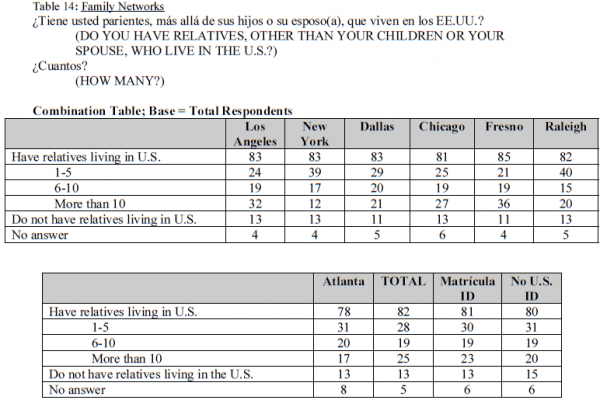Large-scale Mexican migration to the United States has been underway for several decades and, as noted above, gained fresh momentum in the second half of the 1990s. One measure of the maturity of this migrant stream is the extent to which individual immigrants are part of an extended network of family members living in the United States. It has long been known that family networks play an important role in facilitating contemporary immigration by helping newcomers overcome logistical, legal and cultural hurdles (Suro 1998; Portes and Rumbaut 1990; Bean and Stevens 2003). The data from this survey, however, demonstrate that today’s Mexican migrants can count on large and extensive networks even when they are recently arrived and even when they are arriving in cities where Mexican migration is a fairly recent phenomenon.
Only 13 percent of the respondents said they did not have any relatives other than a spouse or children in the United States, and the result was about the same (15%) for those who had been in the United States five years or less and for those who said they had no U.S.-issued photo ID. Conversely, nearly half (44%) said they had six or more relatives living in the country and a quarter said the number was 10 or more. These results varied from city to city in one regard. Smaller shares of migrants in new settlement areas reported having many relatives in the United States than those in the traditional areas, but nonetheless the number who counted no relatives at all was similar. In other words, Mexican migrants in the new settlement areas may have fewer relatives in the United States, but the vast majority, just as in the traditional settlement areas, do have some.
These family networks tend to be concentrated geographically. Two-thirds of the full sample said they had relatives living in the same town or city or the United States, and these results were substantially consistent across all of the city samples. Nearly a third of the respondents in the full sample said they had six or more relatives living in the same city.


